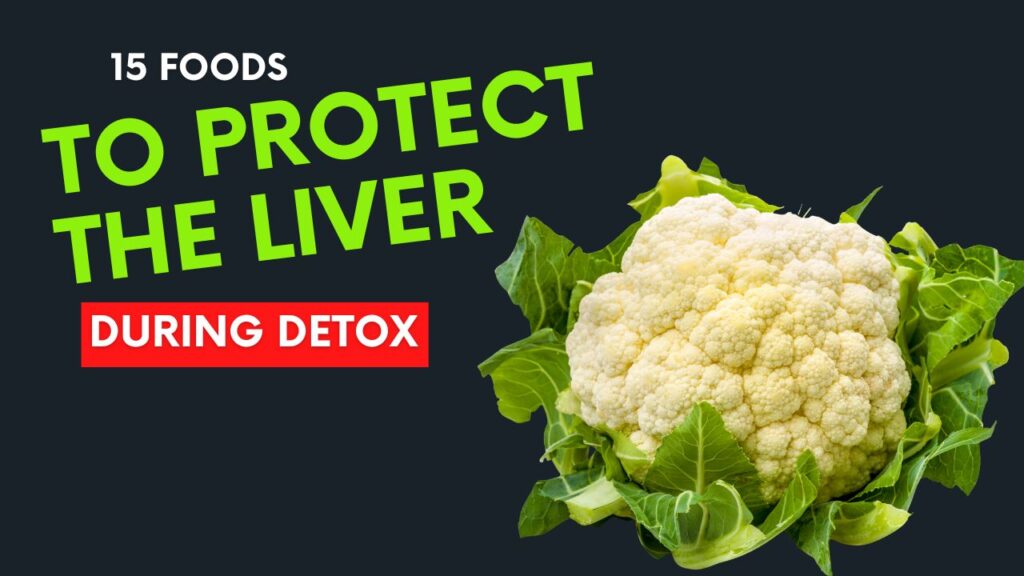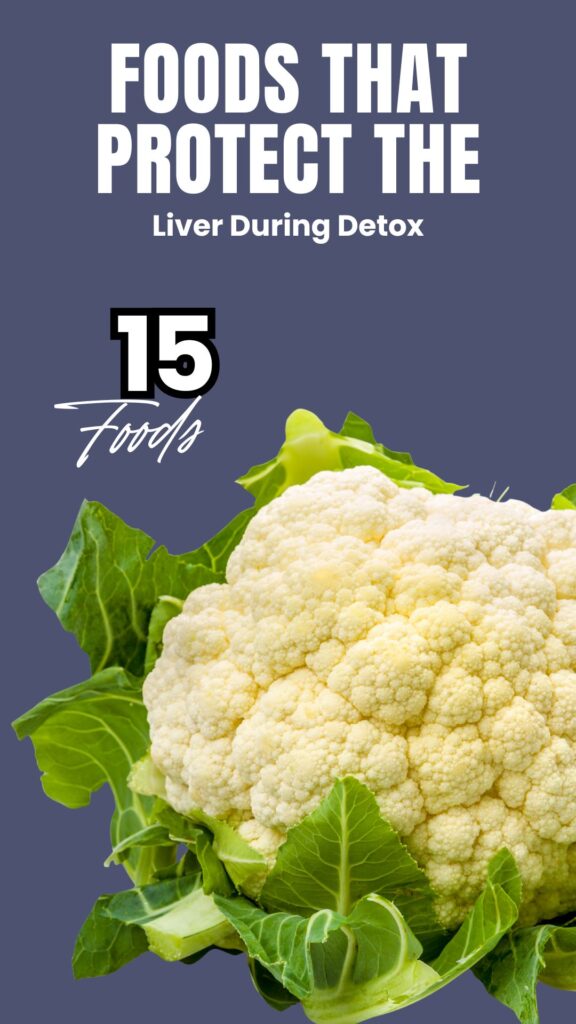Struggling with fatigue, bloating, or digestive discomfort? Your liver might be silently overworked.
Did you know that the liver processes over 1,500 different substances every day, including toxins from food, alcohol, and the environment?
Supporting it with the right foods can enhance its natural detoxifying ability, improve energy levels, and even aid in weight management.
In this post, we’re diving into 15 powerful foods that protect your liver during detox. You’ll learn not just what to eat, but also how to eat it, who benefits most, and key tips to maximize its liver-friendly properties. Let’s explore these nutrient-packed foods that can transform your liver health.

Table of Contents

15 Foods That Protect Liver
1. Garlic
Why it’s good for the liver: Garlic contains allicin and selenium, compounds known to activate liver enzymes that flush out toxins.
Best Ways to Eat or Use It:
- Raw in salad dressings or dips.
- Roasted and added to soups or roasted vegetables.
- Infused in olive oil for cooking.
Tips to maximize nutrient absorption: Crush or chop garlic and let it sit for 10 minutes before cooking to preserve allicin.
Who Should Eat / Avoid:
- Good for: people with high cholesterol, immune support seekers.
- Avoid if: you have garlic allergy or digestive sensitivities.
Storage & Buying Tips:
- Choose firm bulbs with tight skin.
- Store in a cool, dry, dark place to prevent sprouting.
Do’s & Don’ts:
| ✅ Do | ❌ Don’t |
|---|---|
| Use fresh garlic daily | Overcook at high heat |
| Crush before eating | Store in humid areas |
Possible Side Effects: Large amounts may cause heartburn or upset stomach in sensitive individuals.
2. Leafy Greens (Spinach, Kale, Arugula)
Why it’s good for the liver: These greens are rich in chlorophyll, which binds to toxins and supports their elimination.
Best Ways to Eat or Use It:
- Fresh in salads or smoothies.
- Lightly sautéed with garlic.
- Added to soups and stews.
Tips: Pair with healthy fats like olive oil to improve absorption of fat-soluble vitamins A, D, E, and K.
Who Should Eat / Avoid:
- Good for: vegetarians, those with anemia, anyone seeking antioxidant support.
- Avoid if: you have kidney stones due to high oxalate content.
Storage & Buying Tips:
- Look for crisp, vibrant leaves.
- Store in the fridge in a perforated bag for up to a week.
Do’s & Don’ts:
| ✅ Do | ❌ Don’t |
|---|---|
| Eat raw for maximum nutrients | Overcook repeatedly |
| Combine with lemon juice | Store in sealed, wet containers |
Possible Side Effects: May affect calcium absorption in those prone to kidney stones if consumed in excess.
3. Beets
Why it’s good for the liver: Beets contain betaines, which help detoxify the liver and reduce fatty deposits.
Best Ways to Eat or Use It:
- Roasted with olive oil and herbs.
- Grated raw in salads.
- Beet juice blended with apple or carrot.
Tips: Cooking reduces some antioxidants, but roasting enhances sweetness.
Who Should Eat / Avoid:
- Good for: those with fatty liver, heart disease risk, or needing liver detox support.
- Avoid if: you have kidney stones (oxalate content).
Storage & Buying Tips:
- Choose firm, smooth-skinned beets.
- Store in fridge, unwashed, in a ventilated bag.
Do’s & Don’ts:
| ✅ Do | ❌ Don’t |
|---|---|
| Include raw or roasted | Overcook in water to avoid nutrient loss |
Possible Side Effects: Beet juice may cause pink urine temporarily.
4. Avocados
Why it’s good for the liver: Rich in glutathione, avocados help neutralize harmful free radicals in the liver.
Best Ways to Eat or Use It:
- In salads or avocado toast.
- Smoothies with spinach or berries.
- Guacamole with lime and herbs.
Tips: Eat with vitamin C-rich foods like tomatoes for extra antioxidant synergy.
Who Should Eat / Avoid:
- Good for: heart health, liver detox, and weight management.
- Avoid if: allergic to latex or avocado.
Storage & Buying Tips:
- Choose slightly firm, dark green fruits.
- Store at room temperature to ripen, then refrigerate.
Do’s & Don’ts:
| ✅ Do | ❌ Don’t |
|---|---|
| Eat ripe for best taste | Microwave or overheat |
| Pair with healthy fats | Store cut without lemon juice |
Possible Side Effects: Excess can contribute to calorie overload.
5. Green Tea
Why it’s good for the liver: Green tea is rich in catechins, antioxidants that improve liver enzyme function and reduce fat accumulation.
Best Ways to Eat or Use It:
- Brew as a hot or iced tea.
- Add lemon for enhanced antioxidant activity.
Tips: Avoid boiling water directly on leaves; steep at 80°C (176°F).
Who Should Eat / Avoid:
- Good for: those with metabolic syndrome, overweight individuals, and antioxidant seekers.
- Avoid if: sensitive to caffeine or have insomnia.
Storage & Buying Tips:
- Buy loose leaf tea for maximum freshness.
- Store in an airtight container away from light.
Do’s & Don’ts:
| ✅ Do | ❌ Don’t |
|---|---|
| Steep 2–3 minutes | Drink excessively in one go |
| Combine with lemon | Add sugar frequently |
Possible Side Effects: Too much caffeine may cause jitteriness or digestive upset.
6. Cruciferous Vegetables (Broccoli, Brussels Sprouts, Cauliflower)
Why it’s good for the liver: They contain sulforaphane, which enhances detoxifying enzyme production.
Best Ways to Eat or Use It:
- Lightly steamed or roasted.
- Added to stir-fries or soups.
- Fermented as sauerkraut for probiotics.
Tips: Overcooking reduces glucosinolate content, so cook lightly.
Who Should Eat / Avoid:
- Good for: cancer prevention, liver detox, and gut health.
- Avoid if: thyroid issues (excessive raw consumption).
Storage & Buying Tips:
- Choose firm heads without yellow spots.
- Store in the fridge, loosely wrapped in a perforated bag.
Do’s & Don’ts:
| ✅ Do | ❌ Don’t |
|---|---|
| Steam or roast lightly | Boil for long periods |
| Include in diverse meals | Ignore portion control |
Possible Side Effects: May cause gas or bloating if eaten excessively.
7. Turmeric
Why it’s good for the liver: Curcumin in turmeric reduces inflammation and supports liver regeneration.
Best Ways to Eat or Use It:
- Add to curries, soups, or rice.
- Blend into golden milk or smoothies.
- Mix with black pepper to increase absorption.
Who Should Eat / Avoid:
- Good for: anti-inflammatory support, fatty liver, and digestion.
- Avoid if: gallstones, or taking blood-thinning medications without doctor approval.
Storage & Buying Tips:
- Use fresh root or high-quality powdered turmeric.
- Store in a cool, dry, dark place.
Do’s & Don’ts:
| ✅ Do | ❌ Don’t |
|---|---|
| Pair with black pepper | Overuse in raw form |
Possible Side Effects: High doses may cause digestive upset.
8. Citrus Fruits (Oranges, Lemons, Grapefruits)
Why it’s good for the liver: Rich in vitamin C, citrus fruits stimulate the production of liver detoxifying enzymes.
Best Ways to Eat or Use It:
- Fresh juice or wedges in water.
- Zest added to salads or dressings.
- Smoothies with leafy greens.
Tips: Vitamin C is water-soluble; avoid excessive cooking to retain nutrients.
Who Should Eat / Avoid:
- Good for: immune support, detox seekers, and skin health.
- Avoid if: acid reflux or citrus allergy.
Storage & Buying Tips:
- Choose firm, heavy fruits.
- Store at room temperature for a week or refrigerate to extend shelf life.
Do’s & Don’ts:
| ✅ Do | ❌ Don’t |
|---|---|
| Eat fresh daily | Rely on canned juices |
Possible Side Effects: Can worsen heartburn in sensitive individuals.
9. Walnuts
Why it’s good for the liver: Walnuts are rich in omega-3 fatty acids and glutathione, which support liver cleansing and reduce fat accumulation in liver cells.
Best Ways to Eat or Use It:
- As a snack on its own or with yogurt.
- Chopped and added to salads, oatmeal, or smoothies.
- Walnut butter spread on whole-grain bread.
Tips: Soaking walnuts overnight can reduce phytic acid and enhance nutrient absorption.
Who Should Eat / Avoid:
- Good for: heart health, liver detox, and brain support.
- Avoid if: you have nut allergies.
Storage & Buying Tips:
- Buy raw, unsalted walnuts for best quality.
- Store in an airtight container in the fridge or freezer to prevent rancidity.
Do’s & Don’ts:
| ✅ Do | ❌ Don’t |
|---|---|
| Eat a small handful daily | Consume salted or sugar-coated versions |
| Pair with fruits or yogurt | Leave exposed to air for long periods |
Possible Side Effects: Overconsumption may lead to weight gain due to high calorie content.
10. Blueberries
Why it’s good for the liver: Blueberries contain anthocyanins, antioxidants that reduce inflammation and protect liver cells from oxidative stress.
Best Ways to Eat or Use It:
- Fresh or frozen in smoothies.
- Topped on oatmeal, yogurt, or salads.
- Baked into muffins or healthy desserts.
Tips: Freeze blueberries to preserve nutrients if fresh ones are not available.
Who Should Eat / Avoid:
- Good for: liver protection, cognitive support, and anti-aging benefits.
- Avoid if: allergic to berries or on blood-thinning medications (consult doctor).
Storage & Buying Tips:
- Choose firm, plump berries without mold.
- Store in a breathable container in the fridge; freeze if not consuming soon.
Do’s & Don’ts:
| ✅ Do | ❌ Don’t |
|---|---|
| Eat raw to maximize antioxidants | Wash and store in water |
Possible Side Effects: May cause mild digestive issues if eaten in excessive amounts.
11. Olive Oil
Why it’s good for the liver: Olive oil contains monounsaturated fats and polyphenols, which improve liver enzyme function and reduce fat buildup.
Best Ways to Eat or Use It:
- Drizzle over salads and roasted vegetables.
- Use as a cooking oil for low to medium-heat sautéing.
- Mix with lemon and garlic as a dressing.
Tips: Extra virgin olive oil has higher antioxidant content; avoid heating at high temperatures.
Who Should Eat / Avoid:
- Good for: cardiovascular support, liver detox, and weight management.
- Avoid if: you have olive oil allergy or fat malabsorption issues.
Storage & Buying Tips:
- Choose dark glass bottles to protect from light.
- Store in a cool, dark place; avoid storing near the stove.
Do’s & Don’ts:
| ✅ Do | ❌ Don’t |
|---|---|
| Use raw for salads or drizzle | Heat at high temperatures |
Possible Side Effects: Overconsumption may contribute to excess calorie intake.
12. Artichokes
Why it’s good for the liver: Artichokes contain cynarin and silymarin, compounds that stimulate bile production and help detoxify the liver.
Best Ways to Eat or Use It:
- Steamed and served with lemon.
- Added to salads or pasta dishes.
- Artichoke extract in smoothies or teas.
Tips: Pair with healthy fats like olive oil to enhance nutrient absorption.
Who Should Eat / Avoid:
- Good for: detox seekers, digestive support, and cholesterol management.
- Avoid if: allergic to plants in the thistle family.
Storage & Buying Tips:
- Choose firm, tightly closed leaves.
- Store in the fridge in a perforated bag for up to a week.
Do’s & Don’ts:
| ✅ Do | ❌ Don’t |
|---|---|
| Steam or boil lightly | Overcook until mushy |
Possible Side Effects: May cause mild digestive discomfort in sensitive individuals.
13. Ginger
Why it’s good for the liver: Ginger contains gingerols, which have anti-inflammatory and antioxidant properties supporting liver health and detoxification.
Best Ways to Eat or Use It:
- Freshly grated in teas, smoothies, or soups.
- Sautéed with vegetables or stir-fries.
- Ground ginger in baked goods.
Tips: Pair with a little fat (like coconut milk) for better absorption of its compounds.
Who Should Eat / Avoid:
- Good for: digestion, nausea, liver support, and reducing inflammation.
- Avoid if: prone to acid reflux or taking blood-thinning medication.
Storage & Buying Tips:
- Select firm, smooth roots without wrinkles.
- Store in the fridge in a paper bag or freeze for long-term use.
Do’s & Don’ts:
| ✅ Do | ❌ Don’t |
|---|---|
| Use fresh or powdered in moderation | Consume in excess raw |
Possible Side Effects: May cause mild heartburn if consumed excessively.
14. Apples
Why it’s good for the liver: Apples are high in pectin, a soluble fiber that binds toxins and helps remove them from the digestive tract, reducing liver burden.
Best Ways to Eat or Use It:
- Fresh as a snack or in salads.
- Blended in smoothies or juices.
- Baked with cinnamon for a healthy dessert.
Tips: Eat with the skin on to retain maximum fiber and antioxidants.
Who Should Eat / Avoid:
- Good for: digestive support, liver detox, and weight management.
- Avoid if: allergic to apples or have fructose intolerance.
Storage & Buying Tips:
- Choose firm, unbruised fruits.
- Store in the fridge for up to 2–3 weeks.
Do’s & Don’ts:
| ✅ Do | ❌ Don’t |
|---|---|
| Eat fresh or lightly cooked | Peel off skin unnecessarily |
Possible Side Effects: Can cause digestive discomfort in sensitive individuals if consumed in excess.
15. Carrots
Why it’s good for the liver: Carrots are rich in beta-carotene and fiber, supporting liver detox and improving bile production.
Best Ways to Eat or Use It:
- Raw in salads or as snacks.
- Steamed or roasted with herbs.
- Carrot juice blended with ginger or citrus.
Tips: Pair with a small amount of fat (olive oil) to enhance beta-carotene absorption.
Who Should Eat / Avoid:
- Good for: eye health, liver detox, and skin health.
- Avoid if: allergic to carrots or sensitive to high vitamin A intake.
Storage & Buying Tips:
- Choose firm, bright orange carrots.
- Store in the fridge in a perforated bag to maintain freshness.
Do’s & Don’ts:
| ✅ Do | ❌ Don’t |
|---|---|
| Eat raw or lightly cooked | Overcook repeatedly |
Possible Side Effects: Overconsumption may cause temporary orange tinting of the skin.
Conclusion
Supporting your liver doesn’t have to be complicated. These 15 liver-protective foods—from garlic and leafy greens to walnuts, blueberries, and carrots—offer a wide range of nutrients, antioxidants, and bioactive compounds that enhance detoxification and overall liver health.
Incorporate them gradually into your meals: a handful of walnuts for a snack, a fresh smoothie with blueberries and spinach, a drizzle of olive oil on roasted vegetables, or a cup of green tea with lemon. Your liver works tirelessly every day, so give it the nutrients it deserves to function optimally.
Frequently Asked Questions (FAQs)
Why is liver detox important?
The liver is responsible for filtering toxins, metabolizing nutrients, and producing bile for digestion. Supporting it with detox-friendly foods helps improve energy, digestion, and overall health.
How long does it take to see results from eating liver-friendly foods?
Results vary depending on diet, lifestyle, and liver health. Many people notice improved digestion and energy within 2–4 weeks of consistent consumption.
Can I eat all 15 foods every day?
While all 15 foods are beneficial, balance is key. Include a variety of these foods across your meals rather than consuming them all at once to prevent digestive discomfort or nutrient overload.
Are these foods safe for everyone?
Most are safe for healthy adults. However, people with allergies, kidney issues, gallstones, or specific medical conditions should consult their doctor before major dietary changes.
Can these foods replace a liver detox supplement?
Whole foods provide natural compounds, fiber, and antioxidants that supplements may lack. Incorporating these foods is generally safer and more effective than relying solely on supplements.
Is drinking green tea every day safe for liver health?
Yes, moderate consumption (2–3 cups per day) is safe for most people. Excessive intake may cause caffeine-related issues, such as jitteriness or digestive discomfort.
Can these foods help with fatty liver?
Yes, several of these foods, such as leafy greens, walnuts, green tea, and artichokes, support liver fat metabolism and reduce oxidative stress, which may help manage fatty liver disease.
Can children consume these liver-protective foods?
Yes, most are safe for children. However, avoid excessive spicy or raw garlic, and monitor portion sizes for foods like nuts to prevent choking hazards.
Do these foods help with alcohol detox?
They can support liver health and detoxification, but they do not counteract the harmful effects of excessive alcohol. Limiting alcohol intake is essential for liver recovery.










